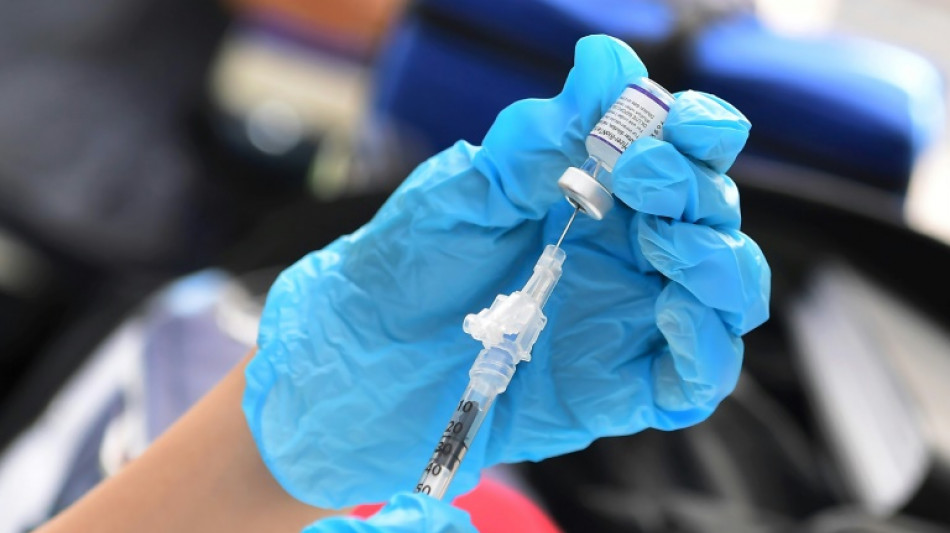
-
 Scandic Trust Group strengthens sales network with First Idea Consultant
Scandic Trust Group strengthens sales network with First Idea Consultant
-
UN warns 'intensified hostilities' ahead in Sudan despite RSF backing truce plan
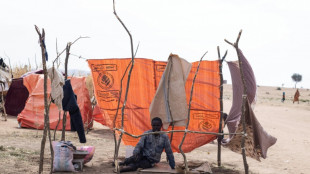
-
 Seven hospitalized after suspicious package opened at US base
Seven hospitalized after suspicious package opened at US base
-
Guardiola says 'numbers are insane' as he reaches 1,000 games in charge

-
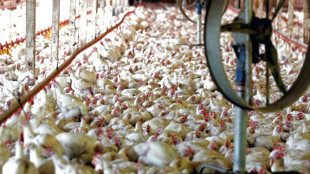 Brazil welcomes China lift of ban on poultry imports
Brazil welcomes China lift of ban on poultry imports
-
Scotland captain Tuipulotu bids for landmark win over All Blacks

-
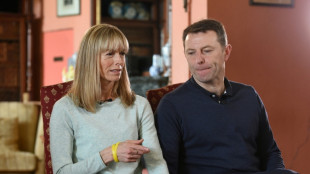 Woman convicted in UK of harassing Maddie McCann's parents
Woman convicted in UK of harassing Maddie McCann's parents
-
Tanzania charges more than 100 with treason over election protests

-
 Nexperia chip exports resuming: German auto supplier
Nexperia chip exports resuming: German auto supplier
-
Genge warns England to beware 'nasty' Fiji at Twickenham

-
 Stocks fall on renewed AI bubble fears
Stocks fall on renewed AI bubble fears
-
UK grandmother on Indonesia death row arrives back in London
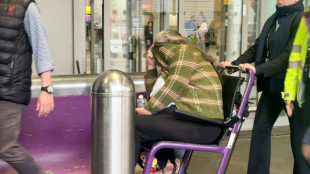
-
 Spanish star Rosalia reaches for divine in new album
Spanish star Rosalia reaches for divine in new album
-
Portugal's Mendes out injured as Neves returns for World Cup qualifiers

-
 Afghan-Pakistan peace talks push ahead after border clashes
Afghan-Pakistan peace talks push ahead after border clashes
-
Fleetwood in tie for lead at halfway stage in Abu Dhabi

-
 Brazil court starts hearing Bolsonaro appeal
Brazil court starts hearing Bolsonaro appeal
-
Serbia fast-tracks army HQ demolition for Trump family hotel

-
 Ireland captain Doris 'mentally stronger' after long break
Ireland captain Doris 'mentally stronger' after long break
-
MSF accuses powerful nations of weakening S.Africa's G20 health text

-
 Maresca defends Chelsea rotation policy after Rooney criticism
Maresca defends Chelsea rotation policy after Rooney criticism
-
Hundreds of flights cut across US in government paralysis

-
 Xhaka 'made me a better coach', says Arsenal boss Arteta
Xhaka 'made me a better coach', says Arsenal boss Arteta
-
Central Nigerian town rebuilds religious trust in shadow of Trump's threat

-
 Inside Germany's rare earth treasure chest
Inside Germany's rare earth treasure chest
-
Former jihadist Syrian leader makes unprecedented White House visit

-
 Kagiyama takes NHK lead in Japan to kick-start Olympic season
Kagiyama takes NHK lead in Japan to kick-start Olympic season
-
Ikea profits drop on lower prices, tariff costs

-
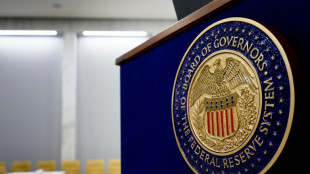 European, Asian stocks decline after Wall Street slide
European, Asian stocks decline after Wall Street slide
-
Tuchel brings 'immense' Bellingham and Foden back into England fold

-
 German FA extends with president Neuendorf until 2029
German FA extends with president Neuendorf until 2029
-
No end to Sudan fighting despite RSF paramilitaries backing truce plan
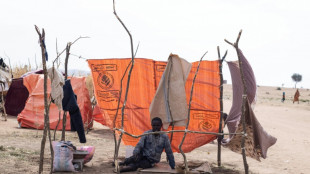
-
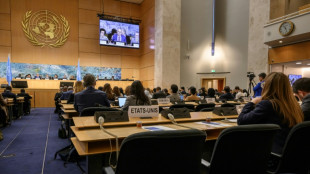 US officials, NGOs cry foul as Washington snubs UN rights review
US officials, NGOs cry foul as Washington snubs UN rights review
-
Injured teen medal hope Tabanelli risks missing home Winter Olympics

-
 Bellingham, Foden recalled to England squad for World Cup qualifiers
Bellingham, Foden recalled to England squad for World Cup qualifiers
-
Tanzania rights group condemns 'reprisal killings' of civilians

-
 Slot urges patience as Isak returns to training with Liverpool
Slot urges patience as Isak returns to training with Liverpool
-
Rees-Zammit set for Wales return with bench role against Argentina

-
 China's new aircraft carrier enters service in key move to modernise fleet
China's new aircraft carrier enters service in key move to modernise fleet
-
Operation Cloudburst: Dutch train for 'water bomb' floods
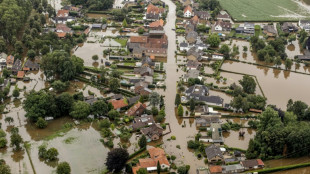
-
 Leaders turn up the heat on fossil fuels at Amazon climate summit
Leaders turn up the heat on fossil fuels at Amazon climate summit
-
US travel woes mount as govt shutdown prompts flight cuts

-
 North Korea fires unidentified ballistic missile: Seoul military
North Korea fires unidentified ballistic missile: Seoul military
-
West Bank's ancient olive tree a 'symbol of Palestinian endurance'
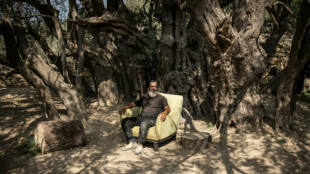
-
 Global tech tensions overshadow Web Summit's AI and robots
Global tech tensions overshadow Web Summit's AI and robots
-
Green shines as Suns thump Clippers 115-102

-
 Japan to screen #MeToo film months after Oscar nomination
Japan to screen #MeToo film months after Oscar nomination
-
Erasmus relishing 'brutal' France re-match on Paris return

-
 Rejuvenated Vlahovic taking the reins for Juve ahead of Turin derby
Rejuvenated Vlahovic taking the reins for Juve ahead of Turin derby
-
'Well-oiled' Leipzig humming along in Bayern's slipstream


Covid's back: Here's what to know this fall and winter
As colder weather sets in, Covid rates are once more rising across the Northern Hemisphere, with several new variants on the scene.
Here's what you need to know.
- Covid versus seasonal nasties? -
The Covid pandemic extracted a terrible toll, with nearly seven million deaths worldwide.
But thanks to vaccines, prior immunity and better treatments, the virus is now far more manageable. In the United States, excess deaths -- the total number of people dying for any given cause -- has been normal since spring.
"If you asked me to choose between getting flu and Covid, I would pick Covid because each individual case of flu is more dangerous," said Ashish Jha, a former White House Covid coordinator and dean of public health at Brown University.
But while Covid is now less deadly to individuals, "it also seems to have higher rates of long term complications."
Covid is also less seasonal than the flu, more contagious, and over the last three US winters peaked from December to January, while flu peaks later.
Amesh Adalja, an infectious disease specialist at Johns Hopkins Center for Health Security, placed Covid "on par" with flu and RSV, but stressed it was more severe than the common cold.
- To boost or not to boost? -
Pfizer, Moderna and Novavax have developed new vaccines that more closely target current variants, all offshoots of Omicron which became dominant in late 2021.
There is broad consensus that annual boosters will benefit the most vulnerable. But whether they bring added value to everyone is debated.
Nearly everyone has already been infected, studies show. And prior infections combined with vaccines have trained immune systems to stop severe outcomes even when they can't ward off infection.
One-size-fits-all recommendations no longer make sense, and could decrease trust in public health, said Monica Gandhi, author of "Endemic: A Post-Pandemic Playbook."
For example, the mRNA vaccines of Pfizer and Moderna carry small risks of heart inflammation in younger men.
European nations advise annual shots only for higher risk groups, but some experts don't see downsides in wider recommendations.
"People at low risk still derive benefit from boosters," said Ziyad Al-Aly, an epidemiologist at Washington University in St. Louis. The United States recommends that nearly everyone get annual Covid shots.
- Are masks still useful? -
Experts diverge on this subject, one of the most controversial of the pandemic.
A review of clinical trial data by the respected nonprofit Cochrane on whether promoting mask-wearing helped slow respiratory viruses found inconclusive results.
Whether broad mandates have a significant effect, therefore, hasn't been proven.
What researchers do know -- thanks to lab experiments -- is that well-fitted, high-caliber masks such as N-95s protect individuals.
"Individuals can therefore choose to wear well-fitted and filtered masks indoors to provide personal protection from respiratory pathogens," said Gandhi, a professor at the University of California, San Francisco -- though she believes in vaccines to prevent severe disease, including among the high-risk.
- Test, or go to work? -
Experts agree that it makes sense for people at risk -- the elderly and those with conditions such as cancer, obesity and diabetes -- to test when they have symptoms.
That's because these groups "would benefit from antiviral therapy within the five-day window," said Adaja.
The most prominent treatment is Paxlovid, which has been shown to reduce the risk of severe disease and death among high-risk people.
Some health systems have decided testing at-risk people is all that's needed.
"Most people no longer need to take a coronavirus test. To prevent the spread of infection, you should try to stay at home if you're unwell," says the UK's National Health System.
- What about long Covid? -
Research around long Covid -- symptoms that linger for weeks or months -- remains nebulous and hampered by a lack of standardized definitions for a condition that has multiple causes, said Adalja.
Al-Aly estimates prevalence at between 4-7 percent, or 65 million people worldwide.
"Unfortunately, we have not made progress on treating long Covid. This should be an urgent priority for research," he said.
It does appear that prior vaccination reduces the risk of long Covid, and that the condition is correlated with severity of infection.
The US government has funded several trials into the condition, with one recent study finding a diabetes drug called metformin reduced the risk of ongoing symptoms by 40 percent.
Jha said he was hopeful of more data on treatments in the coming months.
Z.AbuSaud--SF-PST



